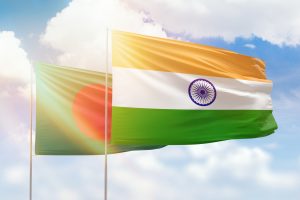Within foreign policy, domestic variables play a vital role. We have seen this in Bangladesh-India relations before. A mural in the new Indian Parliament building that was termed by a Bharatiya Janata Party (BJP) minister as depicting “Akhand Bharat” (Undivided India) caused Bangladesh’s government to ask for an explanation from India’s Ministry of External Affairs (MEA) – because the mural seemingly called into question the existence of Bangladesh as a state altogether.
In a similar manner, Prime Minister Narendra Modi’s speech at the Red Fort on the occasion of India’s 77th Independence Day, which called out “dynastic politics” as one of the three ills of democracy, was seemingly aimed entirely at India’s domestic context. However, his remark might also be a reason for insecurity for the Sheikh Hasina government in Bangladesh, given the Awami League is identified as a symbol of dynastic politics.
As of now, the Bangladesh government hasn’t responded or shown any sign of insecurity toward this comment from Modi. It may simply have enough on its plate at the moment. After all, the Hasina government currently finds itself in a tricky situation leading up to the Bangladesh general elections in January 2024.
This year, the BJP-led Indian government has met with the Bangladesh Nationalist Party (BNP) and also the Jatiyo Party. While a BNP delegation met India’s high commissioner to Bangladesh, Pranay Verma, in March, a delegation from the Jatiyo Party visited India earlier this month. The BNP meeting with Verma – which has been termed as “regular outreach to all stakeholders” – was the first such engagement between India and the Bangladesh opposition party in more than a decade.
Even if India is only engaging with the BNP and Jatiyo Party as part of its regular outreach, this still counts as a shift from India’s behavior toward the Bangladesh national elections as seen in 2018. Back then, no such outreach was entertained and sources at India’s MEA said that “India does not see any ‘credible proof’ for any clear shift in the BNP’s policy towards New Delhi.”
Additionally, India’s response was curiously restrained when the European Union Election Exploratory Mission in July initiated a dialogue with the anti-India Jamaat-e-Islami. While this engagement did not sit well with people within the MEA, yet the ministry did not make any statements related to this meeting. By the same token, while many regional papers in Indian states neighboring Bangladesh published articles criticizing the EU meeting with the Jamaat, no leading national media outlet published this story. Thus, it wouldn’t be wrong to assume that India took pains to refrain from commenting on the EU-Jamaat interaction.
Instances like the ones mentioned above hint that India is taking a much more inclusive approach toward the 2024 Bangladesh national elections, rather than putting all its bets on the Awami League as seen in the past. This could be a reason for insecurity within the Awami League government. Amid the broader context, the AL may have decided it would be unwise to question Modi’s comments on dynastic politics – despite Sheikh Hasina leading a dynastic party as well as having close relations with the Indian National Congress, whose members she meets during her India visits.
India has also shown its interest in ensuring that the national elections in Bangladesh are free of violence and follow appropriate democratic processes as emphasized by MEA spokesperson Arindam Bagchi during the Ministry’s weekly media briefing held on August 3. This viewpoint is in line with the U.S. position on the Bangladesh elections, and thus a report by The Telegraph that security establishments across India and the U.S. have held meetings together to create broader consensus on the elections might have some merit.
That would also represent a shift from India’s behavior during the 2018 Bangladesh national elections, when India and the United States had major differences over the elections. In 2018, Washington expressed concerns over “credible reports of harassment, intimidation, and violence in the pre-election period” and “election-day irregularities… which undermined faith in the electoral process.” However, Modi’s decision to quickly congratulate Hasina for winning the 2018 election helped turn the tide and ensure the AL faced no serious international pushback.
There is no doubt that the Modi-Hasina camaraderie is the reason why India-Bangladesh relations have been described as being in a “golden chapter.” In Hasina’s regime, India finds a government that is focused on anti-terrorism, isn’t anti-India, and has been crucial for the flourishing of India’s Northeast. But at the same time, attacks on Hindus have occurred under the Hasina government, especially the 2021 violence against Hindus. Furthermore, while Bangladesh might play a critical role for connectivity with India’s Northeast, that can cut both ways. In the backdrop of the ongoing conflict in Manipur, the Meitei community has voiced concerns about an alleged influx of illegal immigrants from Bangladesh.
Thus, the benefits brought in by the Hasina government aren’t absolute. That might also explain why there is a shift in the BJP-led Indian government’s behavior, compared to 2018.
All these instances and nuances, which establish India’s change of behavior toward Bangladesh’s national elections, can play a role in developing insecurities for the Hasina government – not just for the 2024 elections but also for future elections.

































